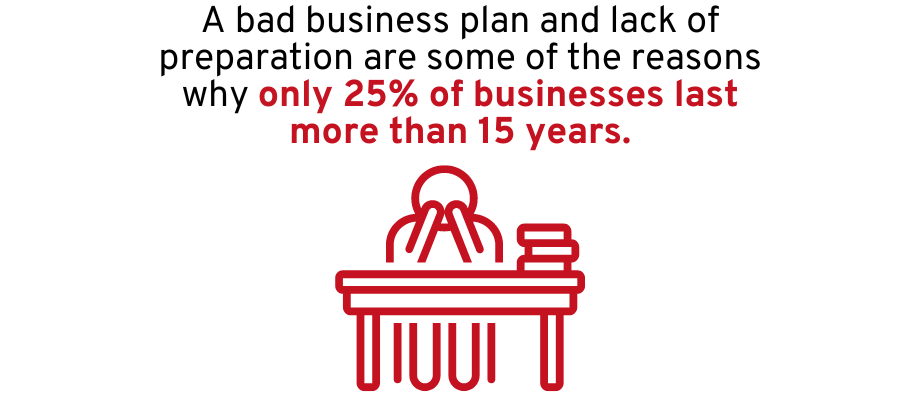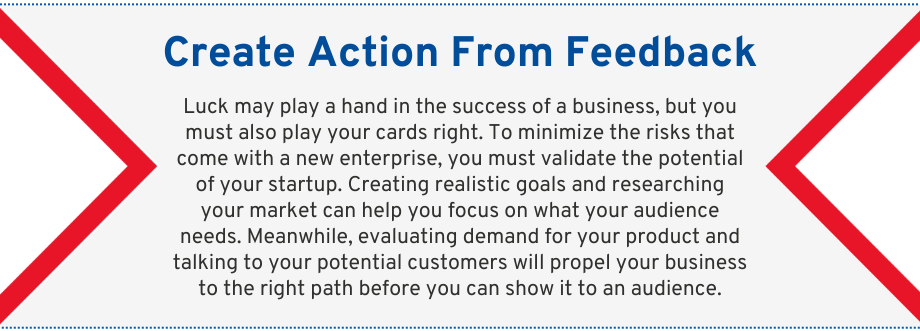They say you can’t rush something you want to last forever. Your startup needs time to grow and find a place within its industry.
In fact, a bad business plan and lack of preparation are some of the reasons why only 25% of businesses last more than 15 years. So, no matter how brilliant your business idea may be, the next step is to test its market potential.
Testing and validating your business can help you predict your idea’s success. Starting early keeps you from wasting time and resources on a plan that isn’t ready to take off. Moreover, it can help you gain insight into improving your offering in the future.
Here are five steps to test and validate your business idea:
1. Set a Clear Objective
Objectives create a roadmap for any startup. These can be short-term to medium-term goals that are not only specific but also measurable. For example, a furniture shop might make it its goal to become the top supplier of luxury sofas in the regional market.
Having a clear picture of what you want your business to accomplish can help you come up with questions and assumptions about your product. These in turn can shed light on any hypotheses that are worth testing, as well as processes that you still need to fine-tune.


Focusing on strong, specific, and measurable goals for your business lets you to construct relevant hypotheses that you can experiment with.
2. Analyze Your Market
Think of your audience in terms of consumers, influencers, and end users. Knowing your market size and share can help you segment and narrow down your target audience. This helps you understand what your customers need and what your competitors are up to.
Research data on your market sales. Assess where your services fit and how much market share you can own. Moreover, identify a function of your competitor that you can top. This can help you formulate stronger marketing strategies, more informed decisions, and better business opportunities.


Knowing your audience size and market share can help you build a relationship with your audience, surpass your competitors, and steer your business in the right direction.
3. Assess Demand
The volume of demand determines whether it’s justifiable to launch your business. This helps you assess which specific products or services will be profitable for your business as well.
One way to check demand is by researching the search volume of terms related to your business. For example, a furniture company would want to know how many people are looking for “cabinets.” Inputting this keyword on SEO keyword search tools can confirm that the demand is high.
Searching for long-tail keywords like “cabinets for small apartments” further lets the furniture company narrow down its target consumer.


Looking up relevant keywords helps you evaluate demand for your product or service, which can lead your business to the correct path.
4. Interview Your Target Audience
Interviewing your audience includes sending out an online survey, writing an email request, or hiring a company that can conduct focused group discussions on your behalf. Knowing what your audience thinks can give you insights into how they can connect better to your brand.
Ask your target audience about their needs and preferences, as well as their motivation for potentially buying what you’re offering. Find out which products they’re currently using and use that information as leverage for improving your services.


Communicating with your audience helps you understand their needs better. Using their feedback also helps you develop your business further.
5. Test With Different Audiences
You can test your product in two ways: through A/B (split) testing or Alpha-Beta testing. The former allows you to split your audience and show them different versions of your product. The latter, on the other hand, requires internal employees then external users to test the prototype.
The end goal of testing your product is to receive feedback from your target audience. Internal users, for example, may be able to spot errors before they reach a wider audience. Meanwhile, suggestions from your external audience can lay the groundwork of your process.


Feedback from product testing helps address your audience’s pain points, improve your processes, and estimate your financial needs.
At Idea Consult, market research doesn’t have to be costly. Intellihance gathers data across different sources so that you’ll be up to date with the latest market trends and opportunities, understand data without sifting through the jargon, and create the best possible version of your business. Start your free trial today.


